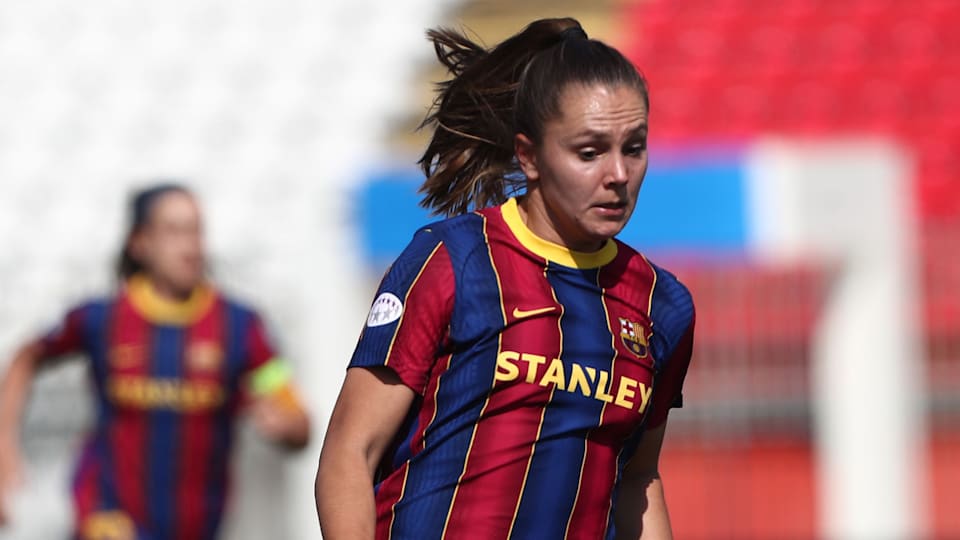
From being inspired by the skills of Ronaldinho as a child, to starring in commercials with Lionel Messi, Lieke Martens has come a long way.
The 28-year-old is the star of the Netherlands women’s football team and come July, the FC Barcelona winger will be representing her country at Tokyo 2020.
Here is everything you need to know about the 2019 FIFA Women’s World Cup Finalist.
Early Years
Lieke Martens fell in love with football at a young age.
"I started playing football at the age of five and I don't think I've stopped since,'' Lieke Martens told Barca Universal.
Up until she was 16 years old she played with boys, because there were no girls teams in her region.
“A lot of people were laughing at me when I was young and I said I wanted to be a professional footballer, they said it was only for boys,” Martens told Reuters.
“But women’s football was really growing. When I got an invitation to play for the national team under-15 side I felt this is really what I love. People used to laugh at me, but now I can laugh at them.”
At 16 she signed with her first club, Dutch outfit Heereveen. Her talent was quickly recognised and doors opened around Europe, playing for clubs in Belgium, Germany and Sweden.
In her 18 months at FC Rosengård, where she won the 2016 Damallsvenskan, the Dutch winger flourished, scoring 20 goals in just 29 appearances. It was 2017, however, when her career reached dizzying heights.
The Dutch women's football awakening
The Netherlands hosted the 2017 UEFA Women’s EURO, in a tournament that changed Martens’ life and the trajectory of women’s football in the country forever.
The Oranje had never qualified for a major tournament before 2009 and in 2015 underwhelmed at their FIFA Women’s World Cup debut in Canada, winning just one match as they bowed out at the Round of 16.
Martens scored the Netherlands’ first-ever Women’s World Cup goal in their 1-0 victory against New Zealand, but the Oranje returned home thinking about what could have been.
On home soil, the EURO’s changed everything.
The energetic and talented Dutch team lead by coach Sarina Wiegman, captured the hearts and imaginations of the host country. Oranje matches became box office events due to the passion and technique of players like Shanice van de Sanden and Vivianne Miedema.
Overnight the players, but especially Martens, became household names.
In front of nearly 30,000 fans in a sold-out De Grolsch Veste in Enschede, the Netherlands were crowned champions of Europe with a 4-2 victory against Denmark.
Martens was the star, scoring three goals in the competition and picking up the Golden Ball award, the prize given to the best player of the tournament.
Since that summer, women’s football in the Netherlands has never been the same.
The team’s home fixtures have sold out in record time and when the Netherlands played at the 2019 FIFA Women’s World Cup in France, their iconic orange-clad fans came with them.
The Oranje reached the final, but lost 2-0 to the USA in front of 60,000 fans in Lyon.
It symbolised the incredible journey of the Dutch women’s national team – a journey that would not have happen had it not been for the skill, creativity, and leadership of Martens.
A star on the rise
Following such an incredible 2017 summer, individual accolades followed for Martens.
She won both the 2017 UEFA Women’s Player of the Year award and The Best FIFA Women’s Player title.
With her popularity sky-rocketing she amassed over 1 million followers on Instagram, featured in commercials with the likes of Lionel Messi and even released her own book in 2019, too.
The heightened focus is understandable given her performances on the park, but female coverage is something that Martens is ambitious about to ensure women’s football continues to be visible for young girls who are starting to play.
It's a role she takes seriously as the poster girl for young female players.
Martens spearheads UEFA’s "We Play Strong" campaign to encourage more girls into football.
When I was young,” she says, “I had no idea there were women players or what I could achieve and now we are role models. Of course I wanted to be involved (in the campaign).”
Continuing Barcelona's Dutch legacy
FC Barcelona’s connections to the Netherlands, and the basis of the famous “tiki-taka” style of football, have been long-established since their signing of Johan Cruyff from Ajax in 1973.
His influence, first as a player, then coach and later in life as an advisor to club, is arguably the biggest any one individual has had on a club’s identity, ever.
It's therefore fitting that, at a stadium that bears the legendary Dutchman’s name, it is another player from his native land that is spearheading Barcelona’s advancements in women’s football.
Following her incredible performances at UEFA Women’s EURO 2017, Martens joined the Spanish giants as the club’s marquee signing. A team she grew up supporting, inspired by the trickery and flair of Brazilian legend Ronaldinho.
Her impact at the Estadi Johan Cruyff cannot be understated.
The domestic dominance of Atletico Madrid has been broken, with Barcelona winning the Primera División for the first time in five years in 2020 following four consecutive titles for Atleti.
On the continental stage, Martens has been instrumental in bringing Barcelona to the upper echelons of the sport in Europe too.
A first UEFA Women’s Champions League final appearance was achieved in 2019 (albeit a 4-1 defeat to all-conquering Olympique Lyon) and, with Martens a significant factor, Barcelona have reached at least the semi-final stage for the past three seasons of Europe’s premier club competition.
